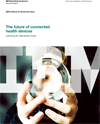
For some years now, medical device makers have provided products and services for consumers who are extremely health or fitness conscious as well as those who need to be regularly monitored because of a serious health risk. And they've been quite successful within these consumer segments. At the end of 2009, the size of the global medical device market was US$290 billion.
As impressive as this is, device makers are generally overlooking a far larger consumer segment that we call Information Seekers. These consumers are relatively healthy, but could use some help managing a health-related challenge. They are looking for solutions that can provide missing information to help them gain greater control over their conditions and ultimately lead healthier, more independent lives.
Download The Future of Connected Health Devices (.pdf, 1.949 KB).
Download from eHealthNews.eu Portal's mirror: The Future of Connected Health Devices (.pdf, 1.949 KB).